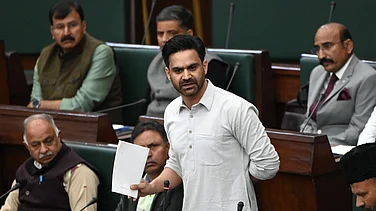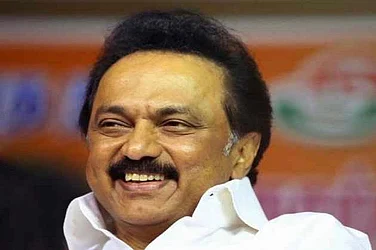Over 46 journalists - many of them young, with merely one or two years of experience - part-time employees and even former journalists with NewsClick, were questioned by the Delhi Police during “raids” in connection with an investigation into the 'dubious' funding of the news website earlier this week. The editor and HR head were arrested the same evening. The searches and arrests were done after a fresh case was registered under the draconian Unlawful Activities (Prevention) Act (UAPA). In short, it was an attack against yet another newsroom in India under the dangerous anti-terror law. Do journalists have any legal protection from this?
“Last post from my phone. Delhi Police taking my phone. Attack on free press” - these words were posted on social media by Bhasha Singh, an independent journalist whose house was also raided in connection with the allegations. The seizure of electronic devices as a means of collecting evidence, although not illegal, has been criticised for the way police override their powers to do the same. Many of those journalists who were questioned by the Delhi Police in this case alleged that the police seized electronic devices from their premises and houses of employees without following any due process such as the provision of seizure memos, hash values of the seized data, or even copies of the data.
What does the law say?
For the police to conduct ‘searches’, Chapter VII of the Code of Criminal Procedure says that a sanction from the court, in the form of a warrant, is required. When an immediate search is necessary, an exception can be made, but even in such cases, the procedure lays down that the police must provide reasons for conducting searches.
"Yesterday, raids were carried out by the Special Cell of the Delhi Police at various locations including NewsClick's offices, residences of journalists and employees. We have not been provided with a copy of the FIR, or informed about the exact particulars of the offences with which we have been charged," NewsClick, however, said in a statement.
With respect to seizing electronic devices, the Information Technology Act mandates that a hash value of the confiscated items must be taken. Hash value is an electronic fingerprint. The use of hash values for seized devices ensures that the material within the devices is not tampered with during the course of the investigation. The police are bound to generate hash values of the seized devices, record them in the seizure memo and provide a copy of it, if the person being raided demands it. However, NewsClick employees say that they weren’t provided hash values or even copies of their data.
Rights of journalists in India during arrests
NewsClick founder Prabir Purkayastha and HR head Amit Chakravarty were arrested in the case filed under the anti-terror law UAPA following allegations the portal received money for pro-China propaganda, and were sent to seven days of police remand. The Delhi Police on Thursday opposed the applications filed by the journalists for the supply of a copy of the FIR to them, stating that the accused had to approach the police commissioner, who would then form a committee regarding the same.
As per the law, at the time of arrest, the police must inform the accused the legal provisions of their arrest and their right to bail. NewsClick said that it had not been given details of any charges, but that it had gathered information that the outlet was being accused of “purportedly carrying Chinese propaganda on its website.”
Freedom of press – In India vs other countries
Freedom of the press in India is not distinguished from the freedom of expression granted to every citizen under Article 19 (1) of the Constitution. This freedom is not without its restrictions which are listed out in Article 19 (2) of the Constitution. While the Supreme Court too broadly recognises the freedom of the press, including the right of journalists to ensure protection of their sources, various courts have ruled differently on this issue. For example, a Delhi court in January this year said there is “no statutory exemption in India to journalists from disclosing their sources to investigating agencies”. Apart from these rights, journalists in India are not categorically protected from abuse and harassment owing to the highly restrictive nature of Article 19 (2).
A UN Report on “Safety of Journalists and Issue of Impunity” recognises that there is a need to protect journalists, especially females from gendered abuses, harassment online, and direct attacks. The laws in India that regulate press and digital media freedoms, are overtly restrictive and disproportionately broad as to legitimately restrict freedom of speech as per Article 19 (2) of the Constitution, the report noted.
United States: Freedom of the press in the United States is legally protected by the First Amendment to the United States Constitution. Most courts have recognised that journalists have a qualified privilege under the First Amendment against compelled disclosure of materials gathered during the course of their work. The Fourth Amendment also protects journalists from unreasonable search and seizure. This means that police cannot search one’s body or belongings without a warrant barring a few exceptions.
United Kingdom: The UK government published its first national action plan to protect journalists from abuse and harassment in 2021. Commitments in the action plan include training for police officers and journalists, while prosecution services across the UK have reaffirmed their commitment to taking a robust approach to crimes against reporters, according to a report by The Guardian. However, Britain has no constitutional guarantee of press freedom.
Sweden: It is the world’s first country to have adopted a press freedom law. The Freedom of the Press Act states that those in authority must be held accountable and all information must be freely available. The law protects the identities of sources who provide publishers, editors or news agencies with information, and journalists can never be forced to reveal their sources. However, some recent amendments to the Constitution have raised concerns about possible sanctions against whistleblowers and journalists who reveal wrongdoings, as per findings of Reporters without Borders.


























